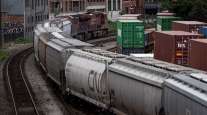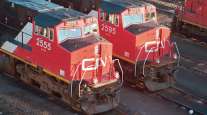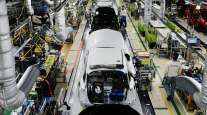Unions Urge Slowdown as Self-Driving Car Laws Pick Up Speed

Labor unions are urging a slowdown as lawmakers fast-track legislation to allow self-driving vehicles on the road, a potential boon to some union jobs and an existential threat to others.
The House Energy & Commerce committee July 27 advanced legislation on a 54-0 vote that would begin the process of changing regulations to allow cars and trucks that operate without human drivers. Similar legislation is being developed in the Senate with rare bipartisan support, an effort supported by automakers such as Ford Motor Co. and Tesla Inc. as well as technology firms Alphabet Inc., Lyft Inc. and others that are developing the vehicles.
RELATED: Bill Gates Backs Uber Freight Rival Convoy
Proponents tout benefits like enhanced safety and improved mobility for seniors and the disabled. But the implications for workers could be significant: Jobs associated with making the vehicles may grow, but commercial drivers could find themselves unemployed.
Larry Willis, president of the AFL-CIO’s Transportation Trades Division, a coalition of 32 unions, said Congress is progressing too quickly without understanding the full effects of autonomous vehicles, which “are likely to cause massive job dislocation and impact worker safety.”
“While the committee has tried to improve this bill, more needs to be done to make sure we adopt the right regulatory and labor policies governing the introduction of autonomous vehicles into the economy,” Willis said in an email.
One study, by the progressive research group Center for Global Policy Solutions, estimated that a rapid transition to automated vehicles could result in more than 4 million lost jobs in the U.S., with taxi, bus, and truck drivers among the hardest-hit.
RELATED: Analysis - We Still Need Truckers, For Now
“If anyone needs to be at the table for a discussion on self-driving technology, it’s the package car driver, the long-haul truck driver and the taxi driver,” James Hoffa, general president of the 1.4-million member International Brotherhood of Teamsters, which represents those drivers, said in a statement.
Union officials have urged lawmakers to keep the current legislative push focused on passenger cars — not trucks and other commercial vehicles — while addressing the employment and safety implications of self-driving vehicles.
Labor unions successfully lobbied for the House to include a 10,000-pound weight limit in the legislation. That means automated semi-trucks and other commercial vehicles without drivers can’t be deployed the way passenger vehicles would be under the bill.
“We definitely value the recognition of the House in seeing that commercial motor vehicles should be kept completely out of this discussion for now,” said Sam Loesch, a legislative representative with the Teamsters. “They create their own host of challenges.”
Demand for autonomous cars could be a boon for United Auto Workers at the U.S. plants of General Motors Co. and Fiat Chrysler Automobiles NV, said Gary Chaison, professor emeritus at Clark University specializing in labor and industrial relations.
Yet for members of the Teamsters autonomous technology presents “a very serious problem,” Chaison said. “Whenever anyone talks about delivery by drone or delivery by automated automobile, then I think you’re talking about the elimination of unionized jobs because of technological change.”
RELATED: Mining Companies Looking at New Fleets, Could Use Autonomous Trucks to Save Millions
The House legislation would allow automakers to gradually introduce autonomous vehicles that don’t comply with safety regulations using exemptions, eventually letting a company field up to 100,000 self-driving cars on public roads. The bill would also direct the National Highway Traffic Safety Administration to establish new safety standards specifically for self-driving cars and would prohibit states from regulating the performance or design of autonomous cars.
Willis said limiting the House bill to passenger cars was a good thing, but the legislation is still a concern.
“It doesn’t take a lot of imagination to see that the bill will set the stage for driverless technology into commercial transportation via Lyft or Uber or other rideshare entities,” Willis said. “And let’s be very clear here: Once you set the precedent in this bill, I think it’s very likely that you are going to see the same type of regulation migrate to commercial vehicles more broadly.”
The House legislation also carves out representation for labor groups on a new autonomous car advisory panel within NHTSA, which could also include a labor-specific subcommittee, but stops there.
Auto industry officials have said it will take decades for fully self-driving vehicles to see widespread use, yet many companies already have deployment plans in place.
Ford plans to field fully self-driving cars without driver controls in ride-sharing fleets by 2021. Heavy-duty truck manufacturer PACCAR is testing a proof-of-concept autonomous semi while Alphabet’s Waymo self-driving car unit is offering rides in Chrysler minivans rigged with self-driving gear to Phoenix residents in a preamble to a true commercial service.
Democratic Representative Debbie Dingell of Michigan, whose district includes three Ford assembly plants, was one of the strongest Democratic proponents in the House for the self-driving car bill. She said the bill is a first step to help keep autonomous vehicle development and assembly in the U.S., and said lawmakers must still tackle workforce issues.
“There are going to be new jobs. We have to keep talking about that. This is just the beginning,” Dingell said in an interview. “If those vehicles get built in another country, those jobs are gone.”




